Background
Papunya is a community 225km west of Alice Springs with a population of approximately 515 people. The CLC’s community development unit conducted consultations and planning sessions with the community between 2013 and 2015 to develop governance arrangements, including a community development working group, and determine what community benefit programs and projects residents would like to allocate their funds to. The community chose a working group to prioritise and plan community benefit projects and in March 2014 it delegated power to the working group to authorise expenditure on completed project plans.
After establishing these governance arrangements, Papunya decided to allocate its initial five year lease money and a small amount of its section 19 lease money income to undertake community benefit projects with the support of the community development unit. From 2012 to 2016 the community allocated $817,450 to 12 community benefit projects which included upgrades to community sporting facilities, improvements to the community store and community transport for health and cultural activities. The community development unit also consulted with residents about compensation income known as the Surprise Well oil affected areas money in 2015 and 2016.
Community members have acknowledged that project governance can be challenging due to competing community interests. The working group initially managed this by funding smaller, less sustainable initiatives, but found it difficult to implement more significant community benefit projects. Between 2016 and 2019 traditional owners decided to distribute most of their lease money to individuals rather than allocate it to projects.
Matched funds trial
At a community meeting in October 2020, however, traditional owners decided to allocate 80 per cent of their community lease income (around $80,000 per year) for the next three years to community benefit projects and to distribute only the remaining 20 per cent to individuals. A significant reason for this reversal was a matched funds trial that sees the income the community allocates to community projects matched dollar-for-dollar by the National Indigenous Australians Agency, thus effectively doubling Papunya’s yearly income for community development projects for three years.
Through this decision, Papunya traditional owners allocated $458,550 section 19 lease money through the CLCs community development program, which was matched with $458,550 matched funds, making a total of $917,101 available for projects. The matched funds program is approved by the Minister for Indigenous Australians from the Aboriginals Benefit Account (ABA).
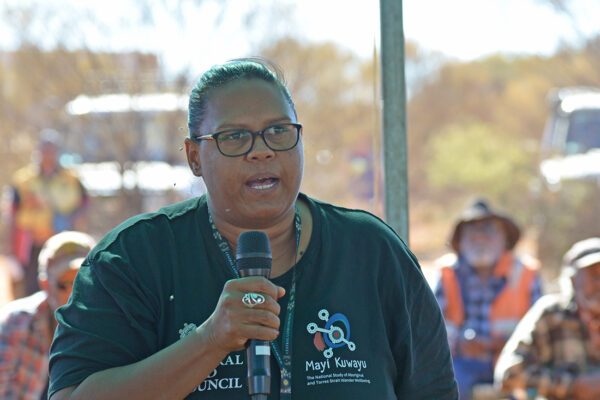
Community members confirmed that the trial was the incentive they needed to allocate the majority of their lease income to community development projects.
“There was a diagram and [CLC staff] explained it. I think it’s good from the government to give us that money…because in our case it’s a lot of money…we looked at it and we actually seen that it was a lot of money because we got it yearly for three years,” working group member and CLC delegate Lynda Lechleitner, (pictured right) said.
The CLC community development team continue to facilitate governance group meetings and consultations with the Papunya community development working group. Community consultations have become increasingly important in the CLC’s work as they allow in depth discussions about projects, governance and associated matters in a less formal setting. They also support the capacity building of individual working group members.
The community increased, diversified and rejuvenated the membership of its working group in 2020 which reflects significant recent changes in Papunya that have seen new younger leaders such as Ms Lechleitner emerge. She described the new dynamic as “the community actually being more open-minded and listening to others”.
“Now there is not just one person speaking. It’s a collective. There are a lot more people thinking ‘that will be a good idea’ or ‘that won’t be a good idea’. You get more discussions,” she said.
Papunya working group member and CLC delegate Terence Abbott said this of the progress that the working group is making; “I just want to see things happen instead of people coming up and down with the same old story. If other people are happy then I’m happy too.”
Working group members now have strong ideas about the future development of their community and want to take full advantage of the opportunity to plan projects with the increased income available through the matched funds trial. Terence Abbott would “like to see a lot of changes with this community”.
“I have been a ranger here since 2010. I was the first one to put my hand up back then. I’d like to see opportunities with tourism [and] fixing up our outstation so we can create employment for our young people,” he said.
At their latest meetings, the governance group continued to move forward with planning and funding their community priorities. In 2021 and 2022, Papunya allocated almost $300,000 of their Matched Funds to two significant community infrastructure projects that community members – through their governance group – identified as a priority: building ablutions at the Papunya sorry camp site and developing shaded community picnic and BBQ areas within the community.
These projects are highly valued as Lynda Lechleitner outlined. “A picnic area for everyone, like even people that are travelling through, so they have actually got somewhere to sit and take a breath before they move on again…projects that are something that the community values”.
The working group has chosen Ranger Works to implement the picnic area project, a fee for service initiative of CLC that prioritises local Aboriginal employment for small scale infrastructure projects.
Ms Lechleitner, from the Town Bore outstation near Papunya, hopes that the community development program will continue to empower her community, “It’s more or less trying to give people a voice and an understanding of what direction they can spend their money in, as a community leader, to better this community. It’s taken a long time for the community to get to where they are now, to tell [the government] what they want as a community.”
“My vision is to get a healthier community where everyone can speak up and be stronger for the community,” she said.
Update February 2023
CLC staff undertook 12 consultations with Papunya’s community development working group members between July and December 2022.
The consultations were part of a process to finalise the picnic area and sorry camp upgrade projects funded by the community’s matched funds and aimed to ensure that residents were involved in the contract and project management.
Working group member Linda Allen said it was important that all working group members can take part in the project development and decision making throughout.
“What is working is [CLC staff member] going around and sitting down and talking to people. It’s a follow-up thing, it’s good. It’s everybody making decisions. When somebody comes up with a good idea [CLC staff members] don’t just go and do it straight away, they are always asking and checking everyone’s opinion,” she said.
The picnic area and sorry camp upgrade projects are due to get underway in 2023, following the execution of contracts with project partners in December 2022.
The Papunya community development working group wants to continue to plan new projects from their priority list.
Update August 2024
Throughout 2023, CLC staff worked closely with governance group members and contracted partners to plan and deliver the ablution facilities at the community sorry camp and community barbeque picnic facilities.
The picnic facilities were completed in August 2023 and the sorry camp ablutions were completed in March 2024.
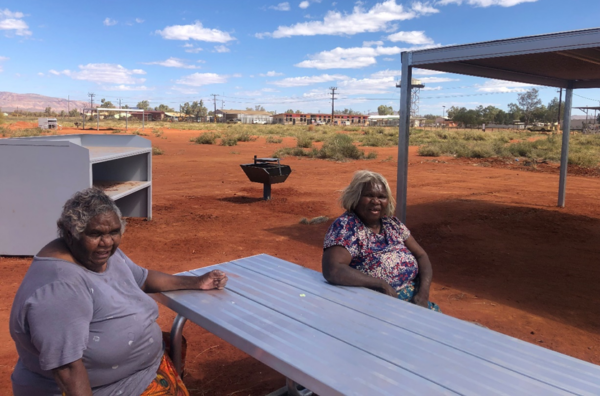
Governance group member Punata Stockman is proud the picnic area project came from a community idea and involved community employment. “I feel happy and proud that it’s happened,” “It’s an Anangu idea, so all Anangu can be happy.” Ms Stockman said.
A younger and very active governance group member, Sarah Stockman explains that despite some frustrations with completion timelines associated with infrastructure projects in remote central Australia Papunya is now able to use these facilities designed, planned and funded by their community. “I’ve lived in Papunya most of my life and I am involved in the working group…It’s just better being in the sorry camp… staying there cause it’s got the toilets and showers…everything that they need there…instead of out into the outskirts of the community where they have to build their own shelters…and the picnic areas are looking really good…they’ve got a barbecue plate, shelters and tables as well where they can actually put their stuff on the tables you know for the cooking and somewhere to sit as well.”
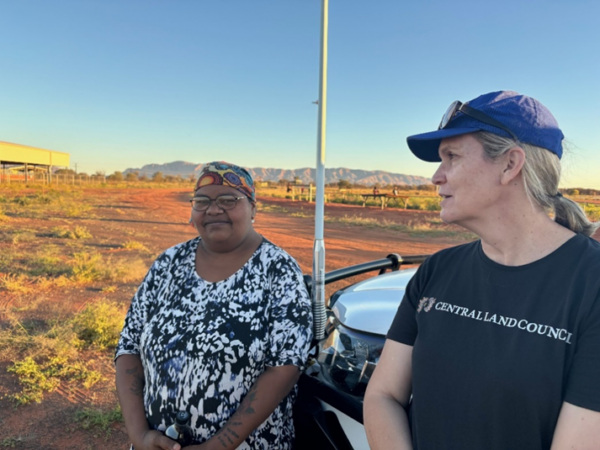
In April 2023, the community also funded a masterplan project. The community will work with remote planning experts to design four playgrounds and an outdoor gym and to investigate community greening and water harvesting options.
The community funded this planning project with the aim of ensuring community can comment on the various aspects of the project and have ownership of the design elements. They also hope it can improve contracting and construction timelines for future community project allocations.
Multiple community consultations on the masterplan project have occurred so far, including trips to Papunya with the CLC and the project partner to consult with community members and stakeholder organisations. A range of community stakeholders are involved in the planning, making it a collaborative process for the aspirations of community members in their development of Papunya.
It is expected that the masterplan will be completed by the end of 2024.
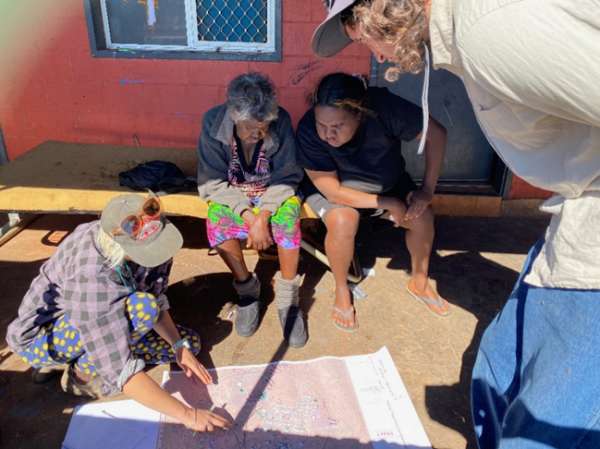
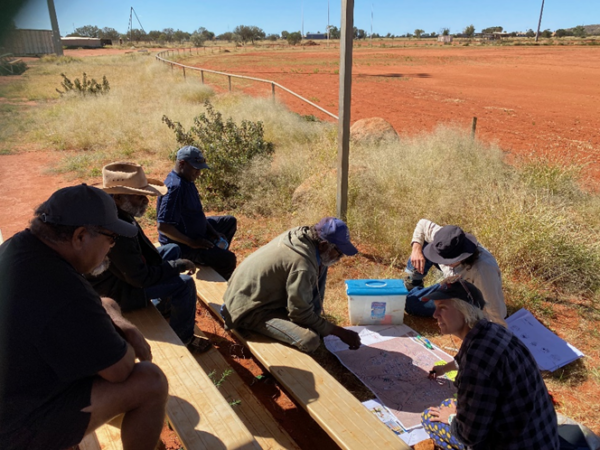
Photos: Landscape architects consult with Papunya community members and community development working group members about the masterplan
